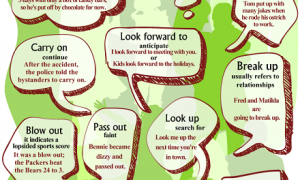你从哪里来? Where are you from?
(X) Where are you come from?
不知道大家有没有住过青旅呢?住青旅可以有很多机会认识来自世界各地的外国游客,这时候通常大家的开场白都会是「你从哪里来?」或是「你来自哪里?」。不过我们开口的时候都很容易受到中文的影响,所以当想说「从哪里来」的时候,好像自然就会想到 come from。不过,还记得我们小时候学文法的时候,老师都会说一个句子里不会有两个动词,而 where are you come from 里就有 are (be 动词) 和 come (一般动词) 两个动词,所以这一句不合符英文文法,正确说法应该是 Where are you from?。
Amy: Where are you from again?
Amy: 你说你从哪里来?
Jack: I’m from Irvine in Scotland.
Jack: 我从苏格兰的尔湾来的。
Amy: Oh I thought you meant the one in California.
Amy: 喔我以为你是说加州那个。
Jack: My Aunt is from California.
Jack: 我姑姑是从加州来的。
Amy: Oh really?
Amy: 喔是喔?
Jack: Yeah–California, Scotland.
Jacl: 对啊,苏格兰的加州。
我会寄给你昨天的照片 I’ll send you the photos from yesterday.
(X) I’ll send you the photos of yesterday.
跟外国朋友出去游玩以后,你用手机拍了很多美照,想把这些美照寄给他们,所以就跟他们说 I’ll send you the photos of yesterday.,这整个句子乍听之下没有问题,不过介系词用错了,不是用 of 而是用 from。
Could you please send me the photos from yesterday? I want to upload them on my Instagram.
你可以把昨天的照片寄给我吗?我想要上传到 IG。
I need some time to sort out some photos taken today. I can first send you the photos from yesterday.
我需要点时间整理今天拍的照片,不过我可以先寄昨天的照片。
Dorian: I’ll send you the photos from yesterday as soon as I get them developed.
Dorian: 昨天的照片等我冲好之后就会寄给你。
Gillian: Thanks! Not many people shoot film photography these days.
Gillian: 谢啦!现在没有什么人会拍摄传统相片了。
Dorian: Actually it’s getting more and more popular.
Dorian: 事实上越来越流行了呢。
Gillian: What’s the appeal of it?
Gillian: 它有什么吸引力呀?
Dorian: I suppose because it makes you think more about what you are shooting.
Dorian: 我想是因为在拍摄的时候它会让你想更多。
Gillian: Because you only get a limited number of chances?
Gillian: 因为只有几次机会?
Dorian: Exactly.
Dorian: 没错。

我喜欢这里 I like it here.
(X) I like here.
当外国朋友问你喜不喜这个地方的时候,我们通常都会回答「我喜欢这里」,如果我们把句子直接以中文逻辑翻译成英文回答的话,这句子的文法就不对了。中文的文法中,我们有时候可以省略代名词或是主词,但在英文文法中可不是如此。 I like it here. 中的 it 其实没有什么特别的意思,但根据英文文法,因为 like 是及物动词,所以后面要有受词,因此「它」还是有存在的必要。
Susan: I like it here–so much history!
Susan: 我好喜欢这里,充满历史气息的地方!
Charles: I think it’s super boring.
Charles: 我觉得超无聊的。
Susan: How can you say that?
Susan: 你怎么会这么说?
Charles: It’s just a bunch of old stuff.
Charles: 就是一些旧旧的东西。
Susan: It’s a lot more than that. this cathedral was hand-built by the Romans!
Susan: 才不只是这样。这座大教堂是罗马人手工建造的!
住旅馆 stay at/in a hotel
(X) live in a hotel
过海关的时候,海关人员都有可能会问你住在哪,如果是住饭店或旅馆的话,正确说法会是 stay at/in a hotel。 live 通常是指「居住」,特别是长期居住,比如说 I live at home. (我住在家里) 或 I live in Zhongshan District. (我住在中山区)。而 stay 所指的居住时间是较短暂的,通常是指「留宿,停留」。
I will stay at my friend’s studio for three nights.
我会在我朋友的小套房住三个晚上。
In recent years, I have started to see accommodation quality as the most important aspect of journey, so I am accustomed to staying at a hotel rather than at a hostel.
最近几年起,我开始认为旅程中最重要的是住宿品质,所以比起青年旅社我比较习惯住饭店。
Jill: Are you fine with camping?
Jill: 露营你 OK 吗?
Devon: I’d rather stay in a hotel to be honest.
Devon: 老实说我宁愿待在饭店。
Jill: But what about the great outdoors! All the fresh air, the scenery …
Jill: 但是你不想亲近大自然吗! ?有新鲜空气还有风景…
Devon: Staying in a hotel is fun as well. And you get to steal all the toiletries and towels when you leave.
Devon: 待在饭店也挺好玩的啊。你还可以在离开的时候偷拿卫浴用品和浴巾。
Jill: I don’t think you’re supposed to do that.
Jill: 我觉得你不该这么做。
晒黑 get tanned
(X) get black
到阳光与海滩的地方,当然少不了要晒日光浴!想跟外国朋友说,你想晒黑一点的时候,可能直觉会想到用 black 这个词。外国朋友听到的时候,可能会想说你是想把自己涂得黑黑吧!如果想说晒黑的话,正确说法是 get tanned。 tanned 是 tan 的过去分词,当作形容词用,形容「被晒成棕褐色的」皮肤;当用作名词时,是指「棕褐色;黝黑」。使用 tanned 这个形容词是指把白晢的皮肤晒得黝黑,如果本身肤色是较黝黑,像来自拉丁美洲的朋友,就不是用 tanned 而是用 dark 唷。除了说晒黑,我们会说晒得像古天乐那样一身古铜色,英文可以说 a golden/dark tan。
Jerry: I’m trying to get tanned but nothing seems to be working.
Jerry: 我想晒黑但都没效。
Paul: Have you tried tanning oil?
Paul: 你有试过助晒油吗?
Jerry: Nah, I burn too easily so I think that would only make it worse.
Jerry: 没,我很容易晒伤所以我觉得那只会更糟。
Paul: Maybe try using a weaker sunscreen?
Paul: 或许用比较弱的防晒乳?
Jerry: I suppose it is worth a try.
Jerry: 我想值得一试。
叫醒服务 wake-up call service
(X) morning call
大家是不是都跟小编一样,现在才发现原来我们一直习惯说的 morning call 是错误的,正确的说法应该是 wake-up call。 wake up 是「起床;叫醒」的意思,而 call 是「打电话」的意思,所以照字面上 wake-up call 是「打电话叫你起床」的意思,而这边的 wake-up 用连字号是因为它当作形容词用。不过,wake-up call 还有另外一个意思是「警钟、提醒」。要记住了,以后去饭店想要这个服务的时候,不要再讲错啰!
Ron: I’m having trouble at work. I keep coming in late.
Ron: 我工作上遇到了问题,一直迟到。
Al: Are you sleeping in or what?
AI: 你是睡过头还是?
Ron: I keep having these really vivid dreams where my alarm goes off and I wake up and get out of bed–but I’m actually still asleep.
Ron: 我一直梦到很鲜明的梦,梦境中我的闹钟响了然后我起床了,但其实我还在睡梦中。
Al: I could provide a wake-up call service for you if that would help.
AI: 如果能帮上忙的话我可以叫你起床。
Ron: Maybe … but what if I dream that you’ve called me?
Ron: 或许吧… 但如果我梦到你叫我起床呢?
Al: Maybe you’re dreaming right now …
AI: 那或许你现在就在作梦…
天气如何? How’s the weather? / What’s the weather like?
(X) What’s the weather?
出门玩之前想问一下外面天气如何,How’s the weather? 或 What’s the weather like? 是正确的说法。当我们用英文询问「…怎么样? / …如何?」,基本上都会是 how 开头。不过如果要用 what 开头,则要在最后加上介系词 like,因为 what 在这边是疑问代名词,所以要搭配介系词。 。
A: How was the weather yesterday?
B: It was sunny. I forgot to wear sunscreen, and I got sunburnt.
A: 昨天天气如何?
B: 大太阳的。我就忘了擦防晒乳,现在晒伤了。
Mike: What’s the weather like there?
Mike: 那里天气如何?
Sean: It’s sunny most of the time.
Sean: 大多时候都是晴天。
Mike: So I shouldn’t bother with an umbrella then?
Mike: 所以我应该不需要带雨伞啰?
Sean: I’d take one. Sometimes there’s sudden rainstorms.
Sean: 是我我会带,有时候突然会有暴风雨。
Mike: Oh, okay … but they clear up quite quickly?
Mike: 喔好… 但很快就会放晴?
Sean: Yeah.
Sean: 对啊。







